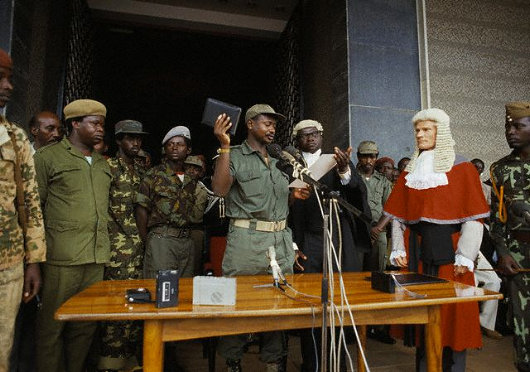
About Andrew Cusack
 Writer, web designer, etc.; born in New York; educated in Argentina, Scotland, and South Africa; now based in London.
Writer, web designer, etc.; born in New York; educated in Argentina, Scotland, and South Africa; now based in London. read more
News
Blogs
Reviews & Periodicals
Arts & Design
World
France
Mitteleuropa
Knickerbockers
Argentina
The Levant
Africa
Cape of Good Hope
Netherlands
Scandinavia
Québec
India
Muscovy
Germany
Academica
The Informal and the Formal

I can’t help but be amused by the brash contrast of the informal and the formal in this photo of Yoweri Museveni’s inauguration as President of Uganda in 1986. The years after Idi Amin’s overthrow in 1979 were almost as turbulent as the rule of the alleged cannibal. Milton Obote, the man Idi Amin had overthrown to gain power, returned to the presidency for five years during which Uganda’s troubles never ceased. In January 1986, the Obote government collapsed after Museveni’s rebel army seized the capital. The old emperor had fled, and the apparatus of state hailed the new emperor as their own. Museveni, Holy Writ in hand and guided by a clerk as the Chief Justice looked on, took the oath of office and formally ascended to the presidency of the nation.
Since then Mr. Museveni has defied expectations. As president he allowed political parties to operate but forbade them from fielding candidates in elections. He hand-picked members from all Uganda’s major political factions and tribes to take part in his government, ensuring all groups had an interest in continued stability and peace. During his so far twenty years of rule, the personal freedom of Ugandans has tended to increase, as has economic prosperity — single-handedly ruined by Amin when he expelled the entire ethnic-Indian merchant & trading class in 1972. When Museveni came to power, Uganda had one of the highest rates of AIDS infection in the world. In open defiance of the West, Museveni’s pragmatic abstinence-oriented education policies have slashed the rate of infection in Uganda from over 20% in the 1980s to just 4.1% in 2003.
Uganda today is far from perfect, and there are still numerous examples of violence and corruption, but the gradual evolution continues. In 2005, Ugandans voted in a referendum to abolish the ban on political parties participating in elections. In the same year, Museveni’s predecessor and rival, Milton Obote, died in exile in South Africa but was graciously allowed a state funeral in the Ugandan capital of Kampala. 2006 saw the first multi-party parliamentary elections in Uganda for a quarter of a century. Museveni’s movement won a comfortable majority with 59%, but the opposition parties still managed to keep things competitive.
And yes, Uganda’s judiciary are still resplendent in their traditional robes of office — something under perpetual threat of abolition back in Mother Britain.
Search
Instagram: @andcusack
Click here for my Instagram photos.Most Recent Posts
- Burns Tower April 19, 2024
- Patrick in Parliament March 18, 2024
- Articles of Note: 13 March 2024 March 13, 2024
- Cambridge March 9, 2024
- Taken on Trust March 4, 2024
Most Recent Comments
Book Wishlist
Monthly Archives
Categories



The New Supreme Court (which reeks of Americaness, coming from an American) is a sham, for they do not wear wigs.
Who’s the honky on the right?
That’s Sir Peter Jermyn Allen, the then Chief Justice, who previously served as a High Court judge, even under Idi Amin.